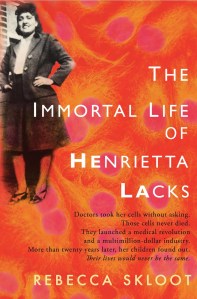“Rebecca Skloot first learned about HeLa cells more than a decade ago, while enrolled at community college. Named after Henrietta Lacks, a poor African-American woman born in 1920, the famed cells were taken from a tumor removed during Lacks’ treatment for cervical cancer. While she died from the disease, her cancer cells proved uncommonly hearty, reproducing at an unheard-of rate, and years later, billions of these cells are used in laboratories around the world.
The Immortal Life of Henrietta Lacks is a story about science and so much more. Lacks died, unaware that doctors would be using her cells to further advances in the scientific community and cashing in on such developments, and she nor her family ever received a dime. In search of justice, Skloot seeks out Lacks’ descendants to learn if they’re aware of the famed cells and to see if they’ve derived any benefit from the important contribution to science their relative made. A fascinating discussion of the enduring legal and ethical questions that human-tissue research raises, Skloot’s debut is a gem.”
Once again, I picked this book up on whim in the bookstore because the cover caught my eye. I love fascinating non-fiction books about normal, every day people and this book definitely fit that description. It looks like I say this a lot, but this book was un-put-down-able! I think because I knew that this happened to a real person, a real family, I was more intrigued. Or maybe my interest was piqued by the fact that both of my parents have had illnesses in the past decade that scientists have used HeLa cells to treat if not cure. Skloot was very thorough in her research and it is obvious to the reader that she came to care for the Lacks family a great deal in the process of telling Henrietta’s story. Maybe it was her passion for the story, coming off of the page, that caused me to read late into the night and on every lunch break until I finished. Whatever it was, I’m thankful for it. It’s sad that it took so many years for the world to learn about Henrietta but I’m glad that I had the opportunity to learn her story. In the end, all Henrietta’s family wanted was confirmation that their mother played an important role in the history of medical science. While they may never receive that from the scientists and doctors that use HeLa cells every day, I think that by allowing her story to be told, they are celebrating, and allowing others to celebrate, what Henrietta’s cells have done for the world.
Paperback
381 pages
Published March 8th 2011 by Crown Publishing Group (first published 2010)
ISBN13: 9781400052189
Goodreads Choice Award for Nonfiction and Debut Author, Nominee for Favorite Book, Favorite Heroine (2010), Wellcome Trust Book Prize (2010), Puddly Award for Nonfiction (2011)

